
Eleventh Meeting of States Parties to the Convention on Cluster Munitions 11 – 14 September 2023
Statement by Sri Lanka
Agenda Item 8: General Exchange of Views
Thank you Mr. President,
Sri Lanka joins other delegations in congratulating you for assuming the Presidency of the Eleventh Meeting of States Parties to the Convention on Cluster Munitions. I wish to assure you of my delegation’s fullest support towards a productive outcome of our deliberations. We also warmly welcome Nigeria and South Sudan as the 111th and the 112th States Parties to the Convention. This is an important step towards universalization of the Convention.
Mr. President,
As a country which has never used, developed, produced, acquired or stockpiled Cluster Munitions even during the time of a brutal terrorist conflict, Sri Lanka wishes to reiterate its strong and enduring commitment to realizing the core objectives of the Convention inter alia ‘to put an end for all time to the suffering and casualties caused by cluster munitions’.
We consider that the Convention on Cluster Munitions is a significant disarmament treaty adopted by more than half of the world in the past decade, with far-reaching obligations.

54th Session of the Human Rights Council
Agenda Item 2 - General Debate
Statement by Her Excellency Himalee Arunatilaka, Ambassador and Permanent Representative of Sri Lanka to the United Nations in Geneva
13th September 2023
Mr. President,
Resolutions 60/251 and 48/141 require that the work of this Council and the OHCHR should be guided by the principles of universality, impartiality, objectivity and non-selectivity, and constructive international dialogue and cooperation.
Unfortunately, this does not appear to be the case with regard to Sri Lanka.
One such instance in the Written Update is the reference to the investigations on the Easter Sunday Attacks of 2019. It is regrettable that the OHCHR has sought to use incorrect and unsubstantiated information from biased sources in their analysis. As Sri Lanka has repeatedly informed this Council, extensive and comprehensive investigations have been carried out by the GoSL with regard to these attacks including a Presidential Commission of Inquiry, the report of which was submitted to the Parliament. Investigations carried out by the Government authorities were assisted by international professional agencies including the Australian Federal Police, the FBI of the United States and INTERPOL.
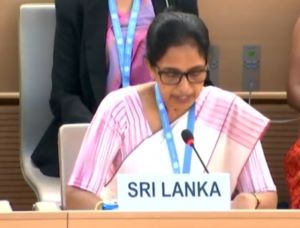
The written update on Sri Lanka was presented at the 54th Session of the Human Rights Council that commenced on 11 September 2023 in Geneva by the Deputy High Commissioner for Human Rights Nada al-Nashif.
Delivering Sri Lanka´s statement as the country concerned, Permanent Representative of Sri Lanka to the United Nations in Geneva, Ambassador Himalee Arunatilaka at the outset reiterated that Resolutions 46/1 and 51/1 were adopted by a divided vote in the Council where the majority of the Member States either opposed or abstained from voting on these Resolutions, in fundamental disagreement with its unacceptable content, in particular the so-called evidence gathering mechanism, the establishment of which is unprecedented.
Sri Lanka rejected the written update by the High Commissioner for Human Rights titled ‘Situation of Human Rights in Sri Lanka’ together with its conclusions and recommendations, while reaffirming its commitment to pursuing tangible progress through domestic institutions.
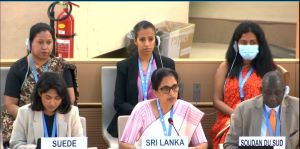
GoSL Statement made by H.E. Himalee Arunatilaka, the Permanent Representative of Sri Lanka to the United Nations in Geneva
54th Session of the Human Rights Council:
Report on Sri Lanka by the High Commissioner for Human Rights
pursuant to HRC Resolution 51/1
11 September 2023
Mr. President,
At the outset, let me reiterate that the Government of Sri Lanka (GoSL) has consistently rejected Resolution 46/1 and 51/1 that led to the setting up of the so-called ‘Accountability Project’. We also reject the written update, its conclusions and recommendations.
We recall that the majority of the Member States either opposed or abstained from voting on these Resolutions, in fundamental disagreement with its unacceptable content in particular the so-called evidence gathering mechanism, the establishment of which is unprecedented. We reiterate that it goes beyond the mandate that Member States conferred on the Council by UNGA Resolution 60/251.
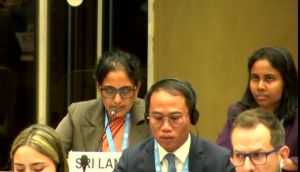
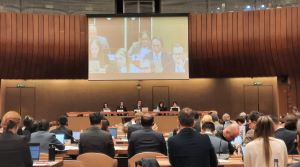
General Intervention by H.E. Himalee Arunatilaka, Ambassador and Permanent Representative of Sri Lanka to the UN in Geneva, on 28 August 2023
Mr. Chair,
Sri Lanka compliments the work accomplished by you as the Chair of this open-ended working group to date, based on the mandate given by General Assembly resolution 76/231. We are thankful to all Member States for their constructive engagement throughout the past sessions towards reaching a substantive outcome of this working group.
Mr. Chair,
Sri Lanka recognizes the common interest of humankind in the exploration and use of outer space for peaceful purposes without discrimination. Sri Lanka has been actively engaging in multilateral efforts for the prevention of an Arms Race in Outer Space (PAROS) over many decades since becoming a signatory to the Outer Space Treaty in 1967. Significantly, Sri Lanka proposed a moratorium on the testing and development of space weapons preceding multilateral negotiations on a treaty to prohibit all weapons in space in 1985.
Intervention by Dr. Samiddhi Samarakoon, National Coordinator, Disaster Preparedness and Response Division of the Ministry of Health on National Inventory of Dangerous Pathogens (NIDP)
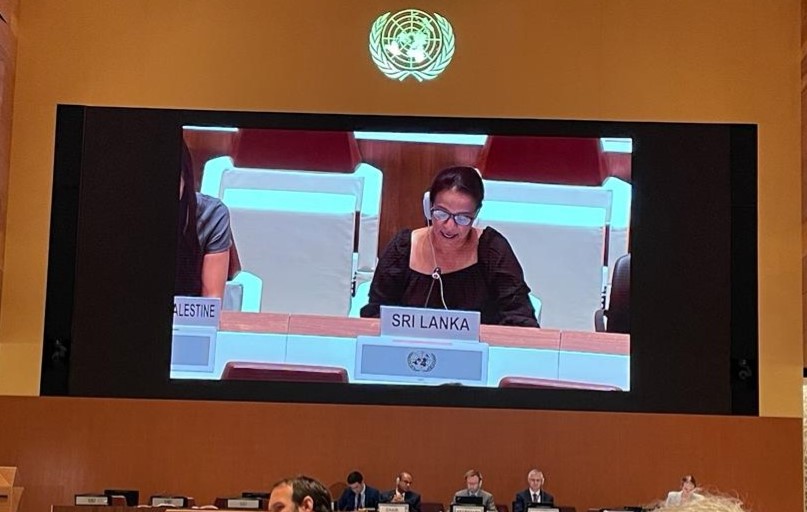
Thank you Mr. Chair,
I take this opportunity to brief on the background of the establishment of National Inventory of Dangerous Pathogens (NIDP) in Sri Lanka which is a key step in national implementation of the BWC. Following the Joint External Evaluation of International Health Regulations (IHR) implementation in 2017, while acknowledging the several activities that were undertaken to improve the biosafety and biosecurity in Sri Lanka, it was recommended to develop a National Inventory of Dangerous Pathogens and Toxins (NIDP) as well to further strengthen the biosafety and biosecurity in the country.
Thus, action was undertaken to develop the National Policy on Biosafety and Biosecurity, including policy statements required to satisfy the 15 Articles of the BWC; appointing two contact points including the National Coordinator, Disaster Preparedness and Response of the Ministry of Health. The Disaster Preparedness and Response Division (DPRD) of the Ministry of Health applied for extended assistance from the UNODA for implementation activities of BWC and BWC-ISU in collaboration with the National Institute of Public Health and the Environment (RVIM), of the Netherlands supported Sri Lanka to develop the NIDP. We are grateful to the Government of the Netherlands and UNODA for this assistance and the European Union (EU) for funding the project.
Intervention by Dr. Samiddhi Samarakoon, National Coordinator, Disaster Preparedness and Response Division of the Ministry of Health on the Implementation of Biological Weapons Convention Plan in Sri Lanka
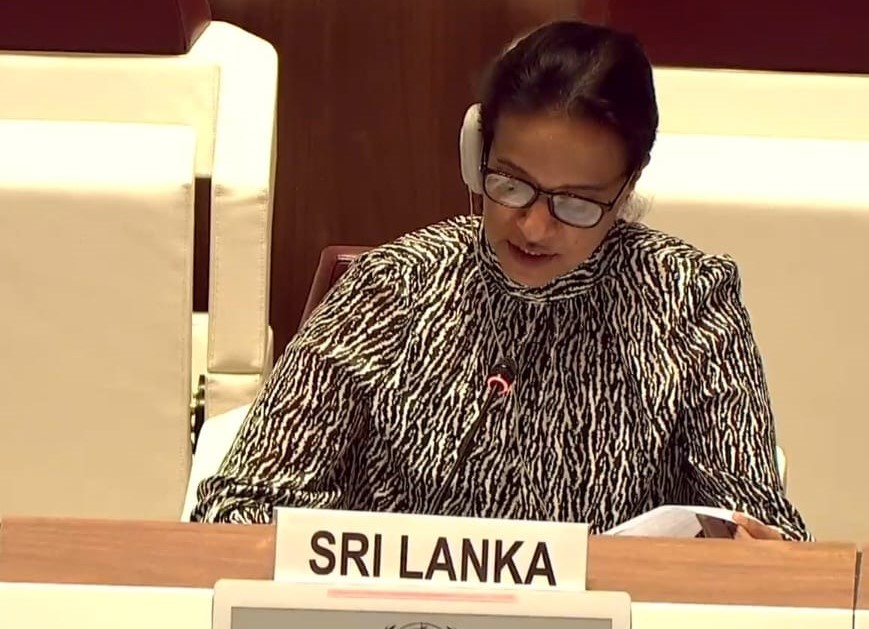
Mr. Chair,
Thank you for giving me the floor. First of all, I would like to express sincere appreciation of Sri Lanka delegation for your steady stewardship of this Working Group. I also thank the ISU staff and the representatives of other international organizations for their presentations on important topics.
Sri Lanka has also been in the forefront of major initiatives in the field of disarmament and was among the very first countries to sign the BWC in 1972.
